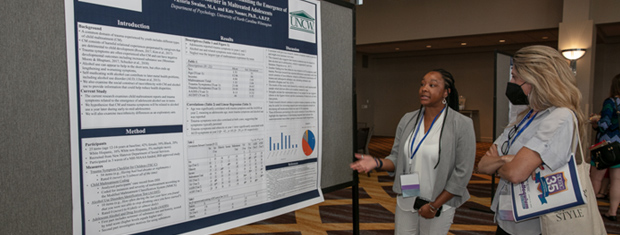




The APSAC Advisor is a peer reviewed quarterly news journal for professionals in the field of child abuse and neglect.
The APSAC Advisor provides succinct, data-based, practice-oriented articles that keep interdisciplinary professionals
informed of the latest developments in policy and practice the field of child maltreatment. It is designed to highlight
best practices in the field and publish original articles and current information about child maltreatment for professionals
from a variety of backgrounds including medicine, law, law enforcement, social work, child protective services, psychology,
public health and prevention in the U.S.
 If you wish to learn more about submitting an article to the Advisor, please click here.
If you wish to learn more about submitting an article to the Advisor, please click here.
This library contains Advisor issues dating back to the first issue in 1988. The most recent issue appears at the top.
Scroll down to select past issues by year and issue number. Once a publication appears in the box, you
can use the Enlarge button to open the document in a new window or tab (depending on how your browser is set up).
This will allow you to view the document with larger print.
To print a document, first use the Enlarge button to open the document in a new window or tab. Then use your browser's Print command.
To return here from a new tab, close the tab. To return from a new window, click your browser's Back button.
In the listing below, click on a year and issue number to see the articles in that publication.
2019 Number 3
Psychological Maltreatment-A Major Child Health, Development, and Protection Issue
Child psychological maltreatment is a widespread condition that seriously damages human beings and their societies. The following brief on the nature and significance of psychological maltreatment (PM) introduces and provides context for a set of articles published in this edition of the APSAC Advisor. PM is recognized as interpersonal/psycho-social violence that limits, distorts, and corrupts basic human need fulfillment. Its major forms are detailed, and its complexity, widespread occurrence, and comparatively high level of prevalence are noted. Three credible assumptions are proposed regarding interventions for PM and other forms of maltreatment: (a) it occurs in standalone forms and is embedded in or associated with all other forms of maltreatment, (b) advances in interventions for all forms of maltreatment necessitate related PM intervention that is central to maltreatment psycho-dynamics, and (c) because PM challenges traditional short-term, narrowly focused, posttrauma reactive intervention practices, it can be a strong catalytic agent for transformation of all maltreatment intervention toward more sensitive and effective child protection and increased emphasis on primary prevention and good caregiving to achieve child well-being.
Reported Rates of Psychological Maltreatment and U.S. State Statutes: Implications for Policy
Psychological maltreatment (PM) is equivalent in harm to other forms of child maltreatment and yet it is not included in all U.S. state child abuse statutes. Prior research has found tremendous variation in rates of reported PM across states using the 1998 and 2007 National Child Abuse and Neglect Data System (NCANDS) data sets. The purpose of the current study was to build on and expand upon the earlier research by examining both the language of state statutes and the 2014 NCANDS data regarding rates of PM. It was found that the difference in reported rates of PM between the state with the lowest rate and the state with the highest rate was 520-fold and that two thirds of state statutes did not define this form of child maltreatment. Reported rates of PM in NCANDS were not correlated with whether PM was defined in the statute, but when a harm standard was present, reported rates were statistically lower. Research and policy recommendations are offered, highlighting the need for experts to develop and for states to adopt a consensus statute definition of PM.
U.S. state statutes demonstrate a clear hierarchy in how harmful the different forms of child maltreatment are perceived (Baker, 2019; Baker & Brassard, 2019). Research does not support this prioritizing of one form of child maltreatment over another. This article presents the evidence (briefly) for considering psychological maltreatment (PM) the equal of child sexual abuse, physical abuse, and physical neglect in contributing to adverse outcomes across the lifespan. PM is also likely more harmful than other forms maltreatment in contributing to depression, lifelong suicide risk, and thought disorders. A longer presentation is available in the APSAC Monograph on Psychological Maltreatment (Brassard, Hart, Baker, & Chiel, 2019).
Implications of Psychological Maltreatment for Universal Intervention
Psychological maltreatment (PM) is a significant threat to the development and health of children and a strong challenge to traditional intervention systems that give it relatively little attention. Dealing with PM requires that human interpersonal relationships (the psycho-social domain), where most of the good and bad things happen to children, must be recognized as the central context for efforts to protect children and promote their well-being, with the latter deserving particular emphasis to achieve desired advances. Here, a wide variety of proven or promising interventions are suggested for consideration, and a case is made for priority among these to be given to primary prevention, a child rights-informed public health approach, and coordinated multi-tiered approaches, emphasizing reflective relational interventions. The INSPIRE seven strategy themes from WHO and its partners are employed to frame proven and promising interventions, most of which have universal value.
Widening the Reach of Clinical Interventions to Reduce Psychological Maltreatment
This article describes how integrated behavioral health care, in pediatric primary care and school-based programs, can prevent and proactively address psychological maltreatment of children. Risk factors for psychological maltreatment are outlined, including community, family, caregiver, and child. The benefit of integrated care models in providing access to evidence-based interventions in settings that are familiar and comfortable to families is highlighted. A three-tiered system approach is utilized that includes universal prevention (tier 1), targeted support (tier 2), and intensive intervention (tier 3) to address a wide range of needs and strives to provide services before involvement with child protective services. Two specific models of intervention are detailed with case examples: HealthySteps in pediatric primary care and an elementary school-based mental health program that includes Cam’s Classroom, a universal program.
APSAC Advisor 31(3): Full Issue